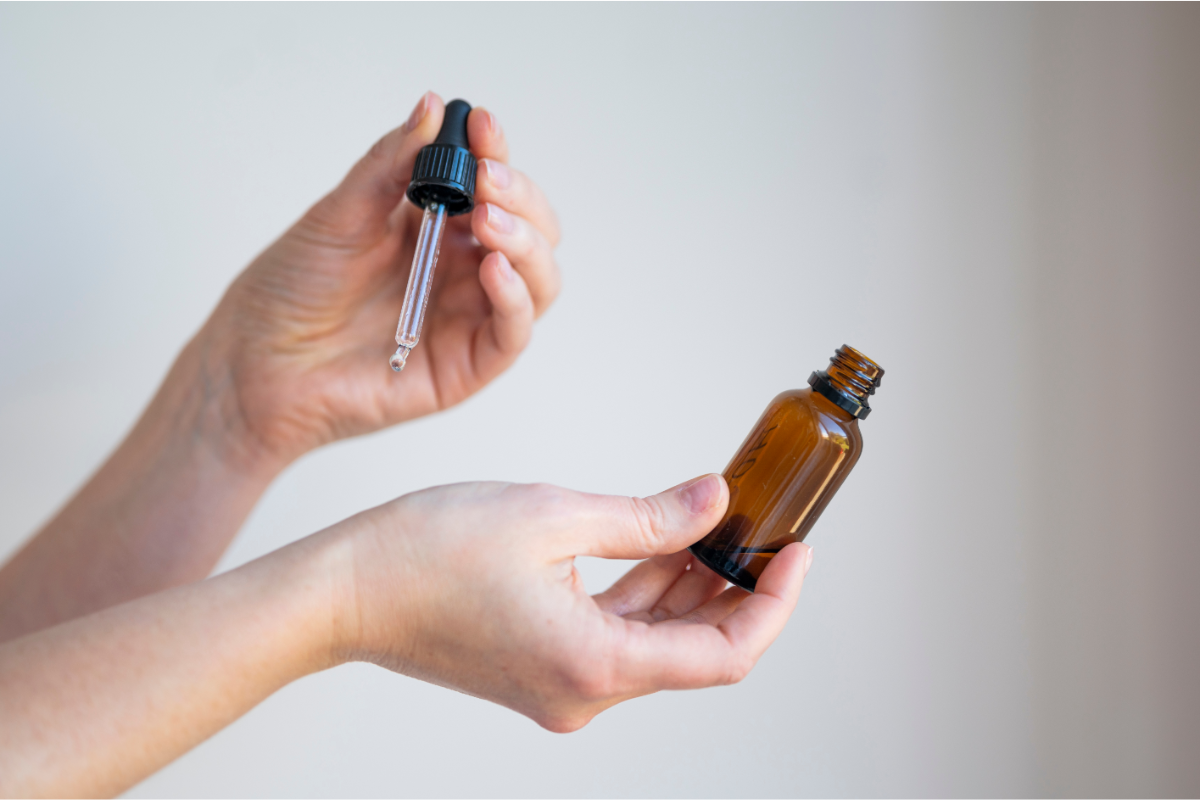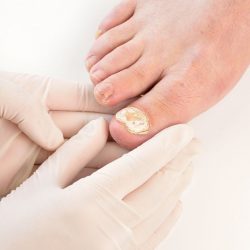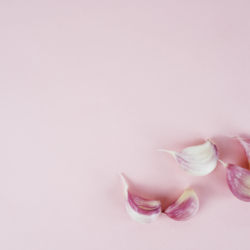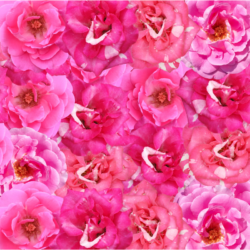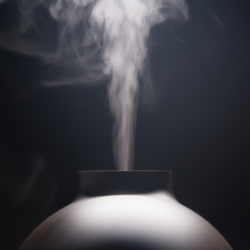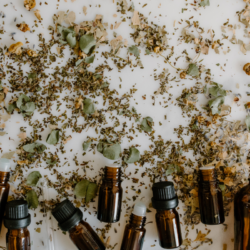Geranium, whose botanical name is Pelargonium graveolens, belongs to the Geraniaceae family. Its essential oil is obtained by distilling its leaves.
History of the Geranium
The rose Geranium is an aromatic perennial bushy plant with a branched habit. Its name comes from the Greek “perlagos” meaning “stork”, as its fruit is reminiscent of a stork’s beak. “Graveolens” translates into Latin as “strong-smelling”. These fragrant species are the result of horticultural work and multiple, repeated hybridisations. So, from one variety of geranium to another, if you crumple the leaves very lightly, you can detect a different fragrance: lemon, orange, pine, apple, mint, apricot, carrot, eucalyptus, cedar, even coconut or chocolate.
Its origins
The ancients were already using geranium as a medicine. Native to southern Africa, geranium is grown in Madagascar, Guinea and Algeria. For a long time, Réunion was the world’s leading producer of geranium essence, mainly Bourbon geranium. Today, geraniums are still grown mainly in Saint-Paul, at altitudes of over 1,000 metres.
Like Ylang-Ylang, the geranium is thought to represent the satisfaction of the senses, sexual harmony and the joy of giving. In the past, it was used in the composition of many love potions. Today, many massage oils for the body and face contain it, often in synergy with rose or rosewood. Egyptian geranium(Pelargonium asperum) is also widely used in perfumery and cosmetology for its sweet fragrance.
Known as a balcony ornament, only a handful of fragrant geraniums are distilled and used for their essential oil (roseum, odoratissimum, asperum). Highly prized in cosmetics and perfumery, rose geranium essential oil is produced in Egypt and China, but the most prized is the Bourbon type, produced in Madagascar or on Reunion Island.
In Celtic times, geranium was considered, along with mistletoe, to be a symbol of immortality and was therefore an offering to the gods. Known as balcony ornaments, only a handful of fragrant geraniums are distilled and used for their essential oil(roseum, odoratissimum, asperum). Highly prized in cosmetics and perfumery, rose geranium essential oil is used in many countries, but the most popular is the Bourbon type, produced in Madagascar.
Pelargonium x Asperum cv Bourbon is the name given to Pelargonium Graveolens grown on Réunion Island, formerly known as Bourbon Island. It was originally planted around houses to keep mosquitoes away .
The Geranium Rosat(Pelargonium Graveolens) was discovered by a naturalist towards the end of the 17th century near the Cape of Good Hope (South Africa). Thanks to its subtropical and temperate climate, South Africa is home to 96% of Pelargonium species.
Cultivation and industry
Although the fragrant cranesbill has diversified its scents thanks to the hand of man, it is not confined to South Africa alone. It can be found on Reunion Island (where it has been cultivated since 1865 as part of the perfume plant industry… It is known as the Bourbon geranium). It is also found in Madagascar, North Africa (Morocco, Algeria, Egypt) and Guinea… Acclimatised in Spain and Italy, its cultivation in France has been a failure.
The Reunion experiment gave rise to the idea of growing geranium for the perfume industry in the south of France (Grasse and the surrounding area) at the end of the 19th century, but the project was abandoned because yields were too low in relation to investment costs. Finally, in China (Yunnan), we find a geranium whose essential oil is richer in citronnellol, making it a slightly different product.
Geranium cultivation took on great importance in Petite France (Village des Hauts de l’Ouest, Réunion), considered at the time to be the Geranium capital. The plant is also widely grown in China, Spain, Italy, Morocco and Egypt.
Its uses
On Reunion Island, crushed leaves or an infusion enriched with a few drops of essential oil are applied to wounds to promote disinfection and healing. The juice extracted from the plant is also used to treat warts. The essential oil is also useful in the fight against shingles. In Madagascar, the traditional use of essential oil is to firm the skin, combat stretch marks and cellulite, and treat digestive mycoses and lice infestations.
Valnet (20th century) recommended it in aromatherapy for sore throats, mouth ulcers, wounds and shingles.
Although the scented geranium has diversified its fragrances thanks to the hand of man, it is not confined to South Africa alone. It can be found on Reunion Island (where it has been cultivated since 1865 as part of the perfume plant industry… It is known as the Bourbon geranium). It is also found in Madagascar, North Africa (Morocco, Algeria, Egypt) and Guinea. Acclimatised in Spain and Italy, its cultivation in France has been a failure.
The Reunion initiative inspired the cultivation of geraniums for the perfume industry in the south of France, particularly in and around Grasse, at the end of the 19th century. However, low yields in relation to the investment required led to the project being abandoned. Finally, in China (Yunnan), we find a geranium whose essential oil is richer in citronnellol, making it a slightly different product.
What are the pharmacological properties of the essential oil of Rose Geranium leaves?
Antimicrobial properties :
Rose geranium essential oil is antibacterial against Gram-positive bacteria(methicillin-resistantStaphylococcus aureus) and Gram-negative bacteria(Pseudomonas aeruginosa), which are often responsible for nosocomial infections. It has a synergistic effect with norfloxacin, helping to limit its toxicity, as well as with ciprofloxacin. This geranium also plays a role in combating bacterial biofilms.
As an antifungal agent, rose geranium potentiates the effects of amphotericin B and ketoconazole on Aspergillus.
Rose geranium and lemon essential oils can also help prevent the invasion of SARS-CoV-2 into the human body.
Antispasmodic properties:
Stimulating the liver and pancreas, geranium essential oil is antispasmodic and, in fact, a muscle relaxant.
Haemostatic, protective and skin toning properties:
Rose geranium essence is a major essential oil for the skin. A skin and lymphatic tonic, it is also regenerating, skin astringent, haemostatic and healing.
Rose Geranium essential oil has scientifically researched dermoprotective properties, making it an ingredient of choice in skin care products. These properties are all the more relevant in the context of skin ageing, a natural process influenced by multiple internal and external factors.
Role in tyrosinase inhibition :
A key study examined the effect of this essential oil on the enzyme tyrosinase, a major player in the skin pigmentation process. Tyrosinase is responsible for the oxidation of tyrosine, an amino acid, leading to the production of melanin, the skin pigment. It has been found that essential oil of Rose Geranium, particularly at the full flowering stage, significantly inhibits this enzyme. This action could therefore help to regulate pigmentation and reduce uneven skin tone.
Comparison with standard antioxidants:
In these studies, the tyrosinase inhibitory activity of the oil was compared with that of quercetin, a recognised antioxidant. With an IC50 value (the concentration needed to inhibit 50% of the enzyme’s activity) of 124.49 ± 0.07 μg/mL, Rose Geranium oil was remarkably effective, although slightly less so than quercetin.
Photoprotective potential :
Research by Lohani et al [70 ] and El Aanachi et al [71 ] revealed that Geranium Rosat essential oil also has photoprotective potential, meaning that it can help protect the skin against the harmful effects of the sun. The sun protection factor (SPF) measured indicates a definite ability to filter UV rays, which is essential for preventing sun damage, such as sunburn, and slowing the signs of skin ageing.
Repellent properties :
Used externally, particularly as a vapour, this oil repels mosquitoes(citronellol) and Aedes aegypti, like the active constituents of garlic essential oil(diallyl trisulphide and diallyl tetrasulphide).
Anti-diabetic effects of Rose Geranium essential oil
In the field of natural health,Rose Geranium essential oil is gaining recognition for its potential anti-diabetic effects. Recent scientific studies have begun to explore this aspect, paving the way for new therapeutic applications.
Regulation of blood sugar levels:
One of the most promising aspects of Rose Geranium oil is its ability to modulate blood glucose levels. According to research published in specialist phytotherapy journals, certain components of this oil could play a role in improving insulin sensitivity and regulating blood sugar levels.
Anti-oxidant effect:
Another important aspect is its antioxidant potential. Free radicals are known to play a role in the development of diabetic complications. The compounds present in Rose Geranium oil, such as geraniol and citronellol, could help to reduce oxidative stress, a key factor in the management of diabetes.
Inhibition of α-Glucosidase:
Studies have also examined the effect of Rose Geranium oil on digestive enzymes such as α-glucosidase. Inhibition of this enzyme can slow the digestion of carbohydrates, contributing to a less marked rise in blood sugar levels after meals, a crucial aspect in the control of type 2 diabetes.
Improved insulin sensitivity:
Research indicates that Rose Geranium oil may promote improved insulin sensitivity, a fundamental for people with diabetes. This potential is due to the oil’s bioactive properties, which may influence insulin-related metabolic mechanisms.
Other properties:
- Stimulates venous and lymphatic circulation
- Oestrogenic properties
- Anti-oxidant and anti-cancer properties
Does Rose Geranium essential oil require any precautions for use?
- Not recommended for pregnant or breast-feeding women
- Tachycardia in prolonged use
- Not recommended for children under 8 years of age
- Contraindicated in cases of cancer or a history of hormone dependence
Medical literature and clinical trials:
- V. -G. de Billerbeck. Essential oils and antibiotic-resistant bacteria. Essential oils and antibiotic-resistant bacteria. Phytotherapy
- Rosato A, Vitali C, De Laurentis N, Armenise D, Antonietta Milillo M. Antibacterial effect of some essential oils administered alone or in combination with Norfloxacin. Phytomedicine. 2007
- Malik T, Singh P, Pant S, Chauhan N, Lohani H. Potentiation of antimicrobial activity of ciprofloxacin by Pelargonium graveolens essential oil against selected uropathogens. Phytother Res. 2011
- Edwards-Jones V, Buck R, Shawcross SG, Dawson MM, Dunn K. The effect of essential oils on methicillin-resistant Staphylococcus aureus using a dressing model. Burns. 2004
- Shin S. Anti-Aspergillus activities of plant essential oils and their combination effects with ketoconazole or amphotericin B. Arch Pharm Res. 2003
- Simões, B. M., Kohler, B., Clarke, R. B., Stringer, J., Novak-Frazer, L., Young, K., Rautemaa-Richardson, R., Zucchini, G., Armstrong, A., & Howell, S. J. (2018). Estrogenicity of essential oils is not required to relieve symptoms of urogenital atrophy in breast cancer survivors. Therapeutic advances in medical oncology
- Sayed A. Fayed. Antioxidant and Anticancer Activities of Citrus reticulate (Petitgrain Mandarin) and Pelargonium graveolens (Geranium) Essential Oils. Research Journal of Agriculture and Biological Sciences, 2009
- Senthil Kumar, K. J., Gokila Vani, M., Wang, C. S., Chen, C. C., Chen, Y. C., Lu, L. P., Huang, C. H., Lai, C. S., & Wang, S. Y. (2020). Geranium and Lemon Essential Oils and Their Active Compounds Downregulate Angiotensin-Converting Enzyme 2 (ACE2), a SARS-CoV-2 Spike Receptor-Binding Domain, in Epithelial Cells. Plants (Basel, Switzerland)
- Plants (Basel). 2022 Sep; Chemical Profiling and Biological Activities of Pelargonium graveolens Essential Oils at Three Different Phenological Stages
- Cardiovasc Hematol Disord Drug Targets. 2022 Feb 16. Effect of Pelargonium graveolens on Glucose Metabolism in Streptozotocin-Induced Diabetic Rats

